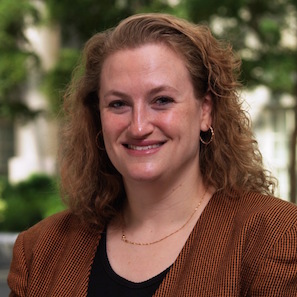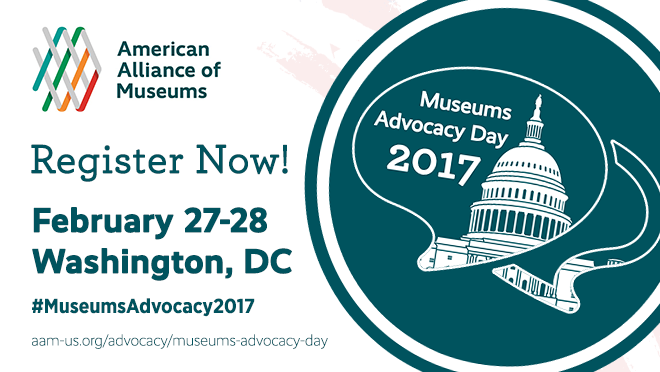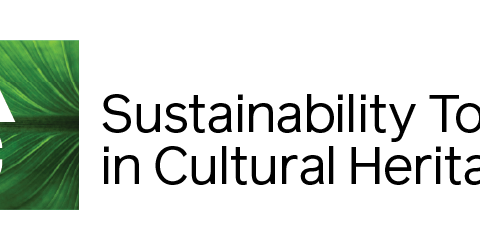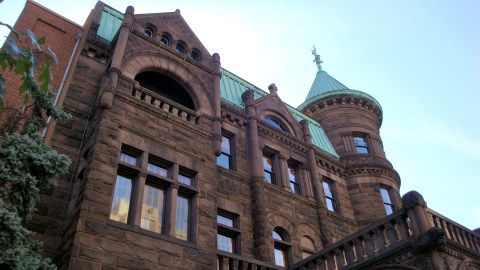
[cs_content][cs_section parallax=”false” style=”margin: 0px;padding: 0px;”][cs_row inner_container=”true” marginless_columns=”false” style=”margin: 0px auto;padding: 0px;”][cs_column fade=”false” fade_animation=”in” fade_animation_offset=”45px” fade_duration=”750″ type=”1/1″ style=”padding: 0px;”][cs_text]Gail Ravnitzky Silberglied unpacks the results of the 2016 election and outlines steps every museum supporter can take to speak up for museums. “If anyone was on the fence about whether participating in Museums Advocacy Day makes a difference, make no mistake: The stakes could not be higher.” Gail is AAM’s VP for government relations and communications and a Capitol Hill veteran.

Following one of the most contentious election seasons, we are preparing for the year ahead. There is a lot at stake, and we look forward to reinforcing the message that supporting museums is a wise investment for our nation. Here are our top takeaways from the 2016 election.
- Bipartisan Support for Museums Will Be Key. Museums have always enjoyed support from both sides of the political aisle, and we will continue to build relationships with all our elected officials—learning about their priorities, finding common ground where possible, and ensuring that lawmakers know that museums are essential. We encourage all museum supporters to do the same.
- Tax Reform Could Bring Changes to the Charitable Deduction. Tax reform has emerged as one of the new administration’s priorities and the president-elect has proposed significant changes to itemized deductions that could significantly reduce charitable giving. Specifically, the president-elect’s tax plan would cap the overall deduction available to taxpayers, which could essentially eliminate the charitable deduction for some taxpayers who already claim other deductions. Charitable gifts account for a full one-third of museum budgets, so it is essential that we preserve the full scope and value of the charitable deduction.
- Recent House-Passed Budgets May Predict 2017 Action. In recent years, we have expressed deep concern about the budget resolution passed by the US House of Representatives, which called for the elimination of the National Endowment for the Arts and the National Endowment for the Humanities, and declared that funding for museums was “not a core federal responsibility.” These annual budget resolutions further stated, “the activities and content funded by these agencies…are generally enjoyed by people of higher income levels, making them a wealth transfer from poorer to wealthier citizens.” While these budget resolutions were ultimately not enacted, the new balance of power—with one political party in charge of both houses of Congress and the White House—could mean that these budget plans become actual appropriations bills, thereby zeroing out key federal agencies that support museums.
- Programs Without Current Authorization Especially at Risk for Defunding. In 2016, Congress spent at least $310 billion—that’s billion with a ‘b’—on programs and activities that were not authorized, meaning that Congress hadn’t recently approved legislation to officially allow (or “authorize”) funding for those initiatives. You may remember that we are currently asking advocates to urge Congress to reauthorize the Institute of Museum and Library Services for another six years, which is now due for reauthorization. The National Endowment for the Humanities and the National Endowment for the Arts were last reauthorized more than two decades ago, increasing their vulnerability in Congress. We need to make sure that every member of Congress understands how grants from these federal agencies come directly back to local communities, including the 40% of the NEA and NEH budgets that is sent directly to state arts commissions and state humanities councils.
- Science Skeptics Could Hamstring Conservation, Research Efforts. The president-elect has expressed skepticism about the existence of climate change and the new balance of power could harm efforts to protect endangered species and further environmental conservation. Museums will have an opportunity—and a responsibility—to reinforce the importance of science, research, and conservation as Congress considers these issues.
- New Messages About the Vital Role of Museums. We already advocate for museums as economic engines, stewards of important collections, and providers of education. And in recent years, we have expanded our messaging to focus on how museums serve teachers, homeschoolers, persons with Alzheimer’s disease, persons on the autism spectrum, and play a key role in supporting literacy and reaching underserved populations. Following the 2016 elections, museums are well-positioned to emphasize their role in spurring travel and tourism; their role in helping wounded warriors; the role of government grants in leveraging private contributions; and the notion of museums as a wise investment in a community’s infrastructure.
- The Country Remains Divided, but Museums Can Help Our Nation Heal. The upcoming battles over the current vacancy on the Supreme Court, immigration, tax reform, regulatory reform, and health care will likely continue to divide the nation. Museums are uniquely positioned to help communities connect—and heal—by serving as a safe space to have difficult conversations. We are inspired by museums such as the Missouri History Museum and the Levine Museum of the New South playing this role and we want to know how your museum is working to bring together your community.
Here’s what you can do to support museums today:
- Register for Museums Advocacy Day. The stakes are extremely high, and we need every museum to be represented. Participating in Museums Advocacy Day—which includes a welcome reception, a day of policy briefings, a networking lunch, breakfast on Capitol Hill, Capitol Hill meetings arranged by AAM, and a Congressional reception—is free for AAM members and members of partner organizations. Visit the AAM advocacy website to register today.
- Engage your board members in advocacy. AAM has launched a museum trustee initiative, and it couldn’t have come at a more critical juncture. Download a copy of Stand for Your Museum Mission and begin a dialogue with your board about how they can play a critical role in advocating for your museum.
- Help us learn about incoming Cabinet officials. As the president-elect begins to nominate officials to serve in his administration, we urge you to share with us connections your connections and insights about those who are nominated to serve in key positions (e.g. secretary of education, secretary of the interior, etc.). By piecing together their background—and, hopefully, connections with museums—we can better anticipate what to expect in the new administration.
- Get ready to make the case. Has your museum created and shared an economic impact statement? Have you created an educational impact statement? Has your museum received a federal grant, or federal funds distributed locally by a state arts agency or state humanities council? If so, gather this information so you are ready to tell the story of how a federal investment in museums is eminently worthwhile.
Thank you for your sustained commitment to advocacy for museums. Learn more about AAM’s advocacy resources to help you make the case for museums.








